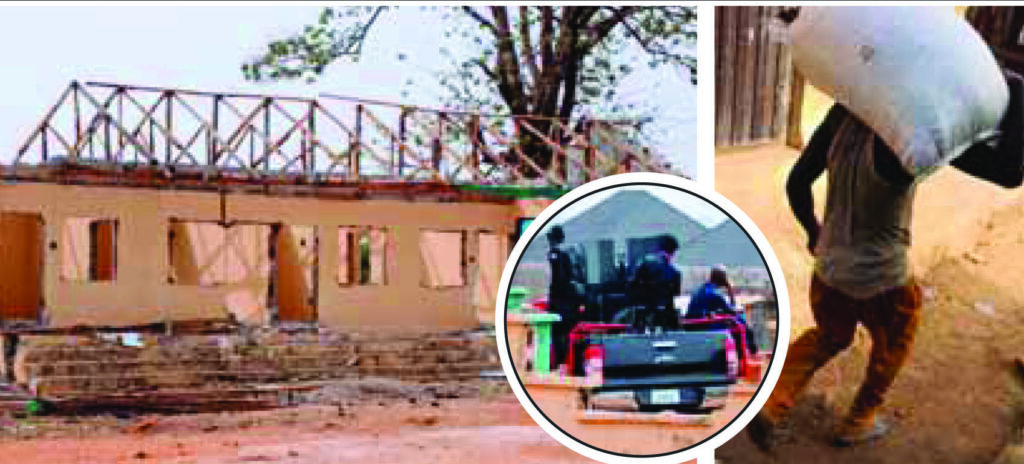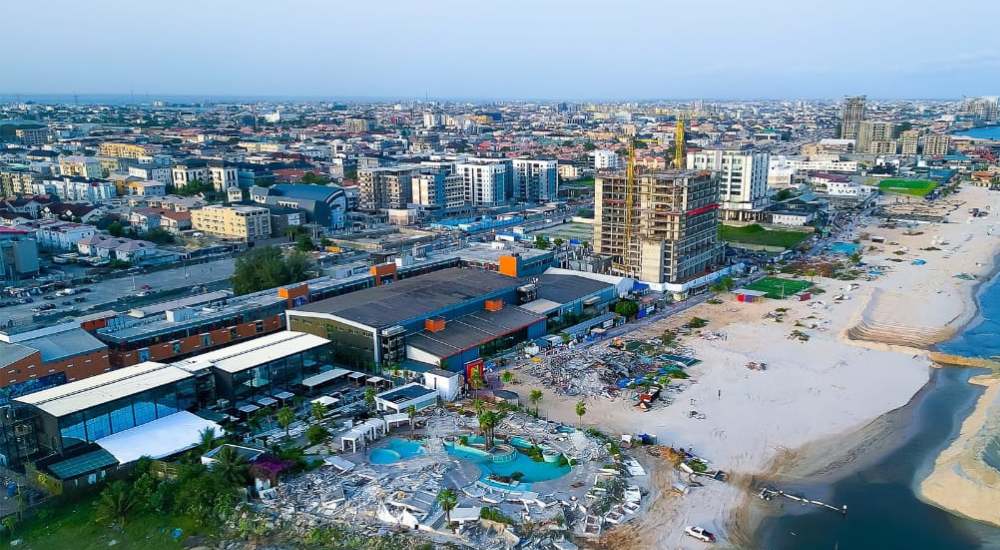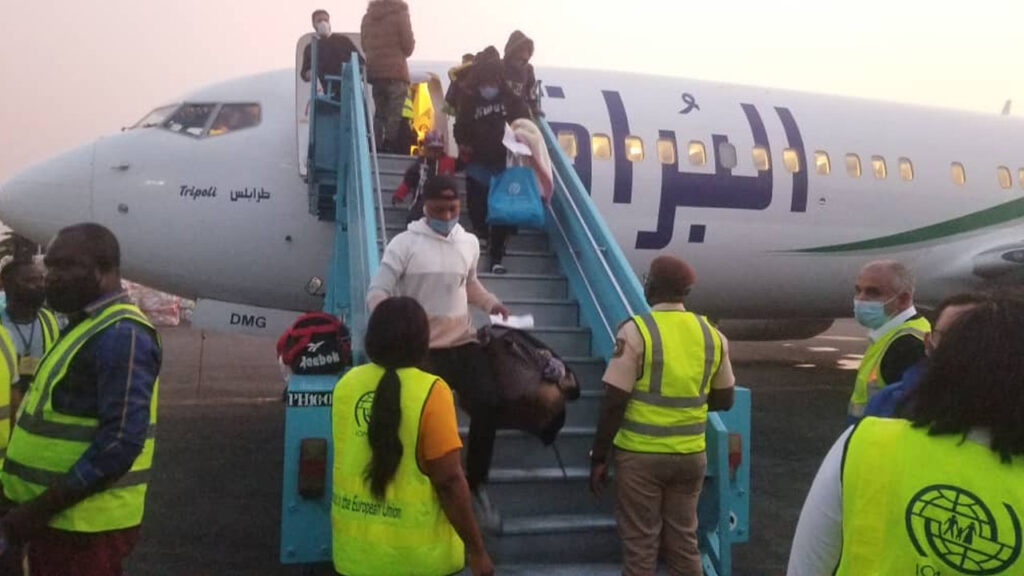
• NEMA denies attack on Abuja facility
• Police arrest 15 suspected warehouse vandals in FCT
• Shettima: Protest against hardship in a responsible manner
The reality of Nigeria’s grim food insecurity exacerbated by rising food cost became apparent yesterday when hoodlums in Abuja went on a looting spree, carting away food items from public and private facilities.
The development at the nation’s Federal Capital Territory (FCT) is coming amid nationwide hardship that triggered protests in different parts of the country and days after some hoodlums hijacked trailers loaded with foodstuff in Suleja area of Niger State as well as a fully-loaded truck of spaghetti around Kaduna.
The hardship even extended to the Correctional Centre in Jos, Plateau State at the weekend as inmates went on rampage to protest against reduction in their food ration.
In what appeared like a repeat of the 2020 #EndSARS protest where government and private organisations counted loses as citizens invaded warehouses and shops to help themselves, yesterday saw hungry Nigerians move in the numbers to the warehouse of the Abuja Municipal Area Council (AMAC), opposite Government Secondary School (GSS) Gwa-gwa, Tasha area of the capital city.
The situation quickly escalated as criminal elements took advantage of the situation and invaded stores and warehouses within the Idu Industrial zone in the capital city to loot private warehouses.
Before deploying about five trucks of security men, the looting which started around 7:00a.m. went on for about two hours before the security forces arrived at 9:00a.m. Officers of the Gwa-gwa Divisional Police later took over the premises. The deployment saw the police repelling over 400 looters who went on to invade the warehouse of Zeenab Food within the area.
As hunger and economic hardship bite harder, the Federal Government will from this week send its armed forces, policemen and men of the Nigerian Civil Defence and Security Corps (NSCDC) to distribute food items.
Coming on the backdrop of rising inflation and skyrocketing prices of food items, a fallout of the economic policies of the President Bola Tinubu’s administration, the current situation is almost akin to the famous phrase attributed to political philosopher, Jean-Jacques Rousseau, which was made popular during the French Revolution: “When the people shall have nothing more to eat, they will eat the rich.”
While Nigeria’s inflation was about 16 per cent in 2020 when the #EndSARS protest grounded the country, the inflation has doubled to near 30 per cent even as a war-rocked Ukraine is sending food aid to Nigeria to rescue millions of Nigerians facing a daily rise in prices of food items amid plans by foreign organisations to halt food export from Nigeria.
Coming at a time when the Nigerian Customs Service (NCS) already suspended plans to distribute seized food over stampede, the Minister of Agriculture and Food Security, Abubakar Kyari, said the office of the National Security Adviser (NSA) would take charge of grain distribution to Nigeria with the help of almost all the nation’s security apparatus, including the armed forces and the police, an indication which shows that the government could be preparing for possible hijack of the process.
The Minister, who disclosed this while fielding questions from journalists in Abuja revealed that the government would flag off distribution of the grains in Niger state, this week. The Federal Government had rolled out plans to distribute 42,000 metric tonnes of grains including Sorghum, Maize Millet and Garri to reduce the impact of rising food prices.
Kyari admitted that delivery of the grains may be an issue, adding however that the government would be doing the delivery state by state. He said: “We are targeting local governments anyway, but we will have to move the grains to the state and then the local councils.”
 Damaged roof/rafters at the Federal Capital Territory (FCT) Agric Secretariat warehouse after hoodlums carted away food items in Idu …yesterday. PHOTO: LUCY LADIDI ATEKO
Damaged roof/rafters at the Federal Capital Territory (FCT) Agric Secretariat warehouse after hoodlums carted away food items in Idu …yesterday. PHOTO: LUCY LADIDI ATEKO
As the Abuja looting spree continued, people living in neighbouring communities like Jabi, Dei-Dei, Jiwa and Karmo town with the intention of partaking in the loot quickly took to the road creating a serious gridlock on Gwagwa-Karmo road. After raiding the store, the rampaging youths headed towards Idu Industrial factory, an area that hosts warehouses owned by individuals and government.
When security operatives took over the government warehouse, the looters resorted to private properties taking away over 500 bags of cement and iron rods, among others.
At the AMAC facility, two trucks offloading grains into the warehouse were emptied as some of the workers ran for cover. A worker who was among those offloading, pleading anonymity, said they took cover when they came under attack by the looters before calling for help.
Explaining further, he said policemen drafted to the troubled spot to bring calm were attacked and chased away by the hoodlums who overpowered them.
“We were offloading two trucks at two of the warehouses when the hoodlums who were more than 100 in number attacked us. They broke the doors, vandalised the silos and carted away the grains and some office equipment.”
When our reporter arrived at the scene of the looting, there was a heavy presence of combined security agencies, who arrived at the scene to de-escalate the situation and arrest some of the looters.
The scene of the attack was also chaotic as doors, gates and roofing sheets of the building were removed along with the rafters while grains were scattered around the dusty environment.
Our reporter also observed that three men were handcuffed by security agents before they were taken away in a police van.
Reacting, the FCT Police Public Relations Officer, (PPRO), Josephine Adeh, told The Guardian that “the situation has been put under control,” confirming the arrest of 15 suspected hoodlums who looted a warehouse in Idu industrial estate, Abuja.
She said: “The command was fully informed about the impulsive attack on the warehouse located at Tasha, Abuja, on Saturday, March, 2024 by some irate mob, which resulted in the vandalism and looting of the warehouse. The Command wishes to state that normalcy has since been restored to the environment and the situation is very much under control, as 15 suspects were arrested, including two local security guards employed by the warehouse management. Exhibits such as 26 bags of maize, five motorcycles and some vandalised aluminum roofing were recovered from the suspects.”
But the National Emergency Management Agency (NEMA) has denied reports that one of its warehouses was looted by FCT residents. Spokesman of the agency, Ezekiel Manzo, in a statement, said: “This is to clarify that the looted warehouse does not belong to NEMA. However, the agency sympathises with owners of the looted facility.
“To forestall any security breach at NEMA facilities, the Director General, Mustapha Habib Ahmed, has directed Zonal Directors and Heads of Operations to strengthen security in and around the agency’s offices and warehouses nationwide.”
Meanwhile, Vice-President Kashim Shettima has appealed to Nigerians to protest the current economic challenges in the country “in a responsible and mature manner,” acknowledging that the economic policies and choices adopted by the administration come with challenges and difficulties that would be “more telling on the poor.”
Shettima spoke in Lagos during the 29th pre-Ramadan lecture organised by the University of Lagos Muslim Alumni with the theme: ‘Economic Reforms for Nigeria: Challenges and Prospects for the Future.’
Represented by his Special Adviser on Political Matters, Dr. Hakeem Baba-Ahmed, the Vice-President also hinted that the forthcoming Ramadan would come with “severe” challenges for many Nigerians. The removal of subsidy from petroleum and the floating of the naira by the present administration had triggered hyperinflation and the rise in cost of food items.
The Vice-President said the reforms might be challenging but the government has no intention to punish Nigerians. He said, “The leadership of President Tinubu recognises that this Ramadan will come with severe challenges for most Nigerians. The road to where we are today was long and full of missed opportunities and tragic failures to build on our great potentials.
“The consequences of our past are the stark realities we face today, such as rising cost of living and pessimism over our prospect to turn round our economy in the direction of growth and inclusive development.
“Yet, my brothers and sisters, we do not have the choice of continuing in the direction that brought us where we are today. We have to fix this country, and failure to do this is not an option. All the options we have are difficult and challenging, and they are, without a doubt, more telling on the poor. If there are easier and reliable alternatives to the policy choices we have adopted, we would have adopted them.
“Our administration does not plan to make the lives of Nigerians more difficult. Nor do we intend to deceive fellow citizens that the change in direction and the expected outcome can be achieved without pain or sacrifices.
“We are also acutely aware that ours is a set of related Nigerian problems, and the solutions we seek must be genuinely informed by a Nigerian context, not the experiences of others or the preferences of special foreign interests, which are removed from consequences of mis-steps or errors of judgment.
“Fellow alumni, I appeal to you to help make space for our administration to achieve the goal of turning our nation around. As products of a distinguished institution, we have learnt that progress is only possible if it is informed by criticism and critical scrutiny. We expect that Nigerians should express their feelings over our circumstances in a responsible and mature manner.”













